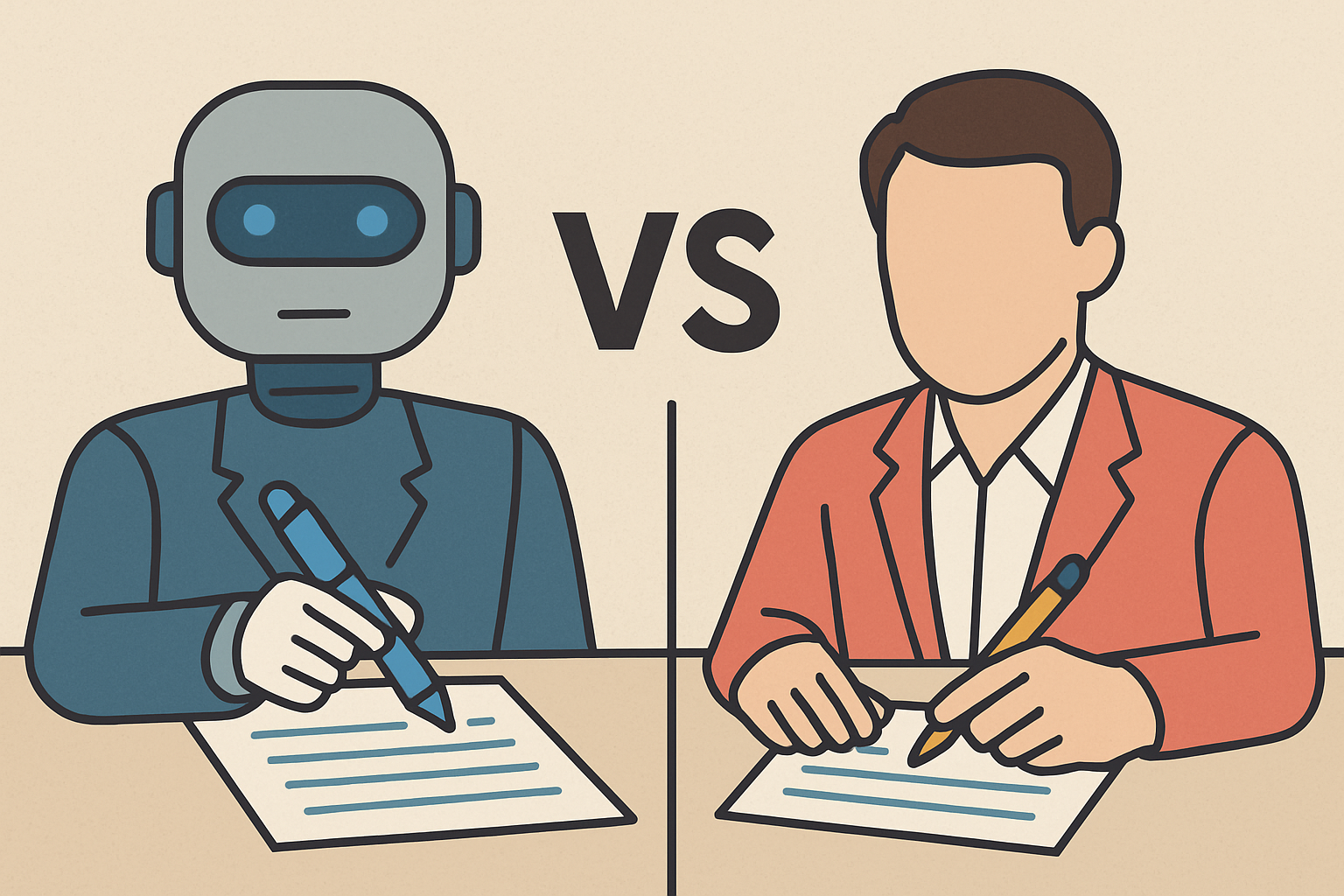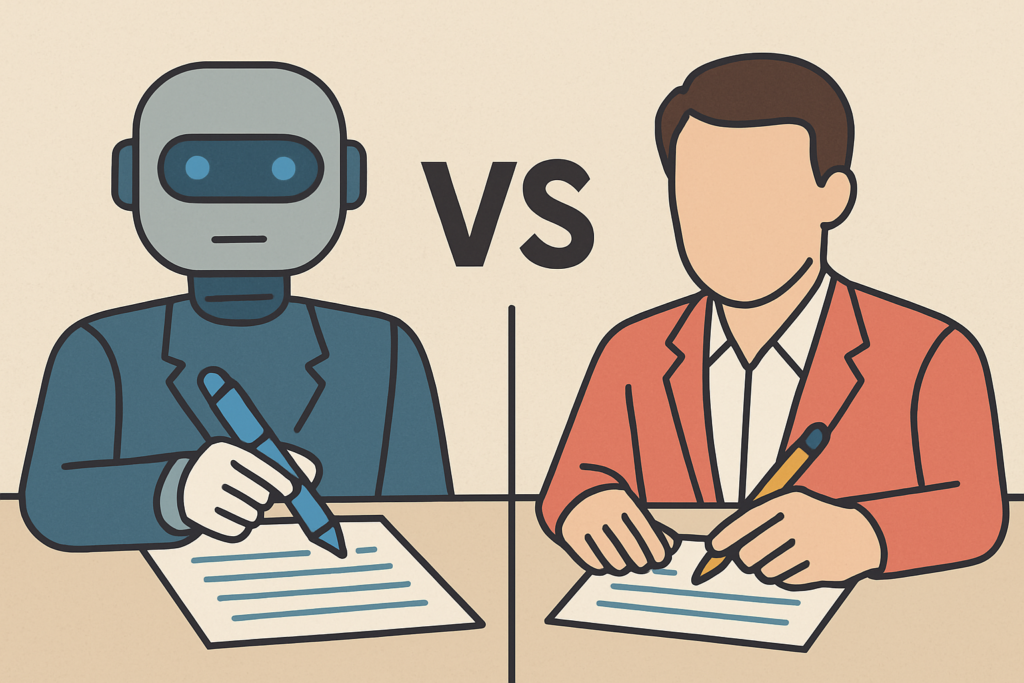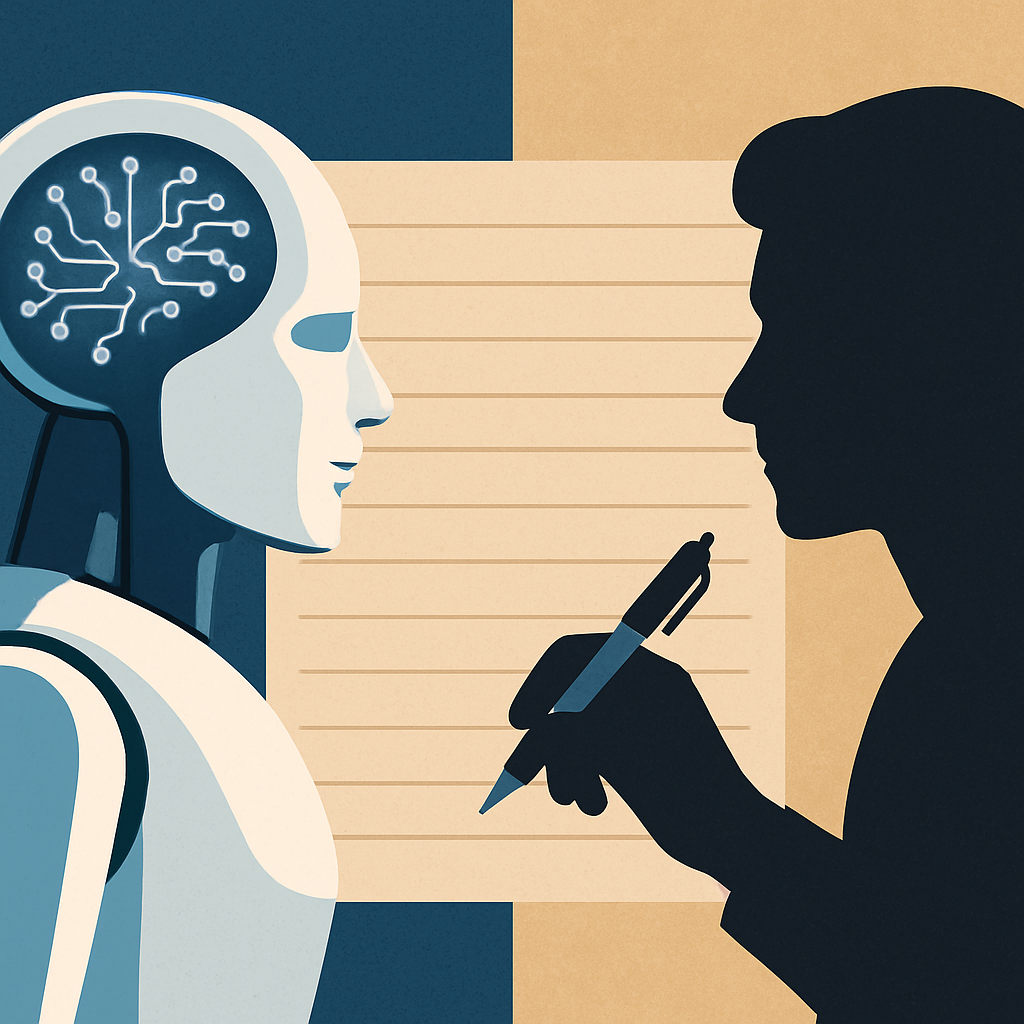Physical Address
304 North Cardinal St.
Dorchester Center, MA 02124
Physical Address
304 North Cardinal St.
Dorchester Center, MA 02124

AI writing tools, AI content generators, AI writing tools, AI vs human writers—these terms are everywhere. They’re not just trending search topics; they reflect a major shift in how content is created today.
Imagine you run a growing online business. You need blog posts, emails, product descriptions—fast. Instead of hiring a writer, you test one of the best AI tools for content writing. Within minutes, you have a polished draft. It’s quick, cheap, and always available.
But as you read it, something feels off. The facts may not be 100% accurate. The tone is flat. It sounds okay, but not great. That human touch—the humor, emotion, creativity—is missing.
This is where the debate begins. AI vs human writers isn’t just about speed or cost. It’s about quality, trust, and connection. Can AI match the voice and depth of a real person? Can a machine write something that truly speaks to people?
In this blog, we’ll explore eight bold truths that uncover the strengths and weaknesses of both sides. You’ll learn when to use AI content generators and when human creativity still matters most.
Let’s dive into the real story behind the future of content writing.

When you’re racing against time, AI content generators feel like a godsend. Whether you’re a small business owner or a marketer, you can create blog posts, social media captions, and product descriptions in a fraction of the time it takes a human writer. With the best AI tools for content writing, you can produce high volumes of content quickly, ensuring that your website and social channels stay active.
But here’s the catch: while speed is an undeniable advantage, it doesn’t always come with the depth you need. Sure, AI can crank out words, but can it capture the essence of your brand, deliver a compelling message, or adapt to specific tones and emotions? Not always.
For example, if you need a blog post that engages your readers, tells a story, and builds trust, an AI content generator might not do the job as well as a human writer could. The AI might give you an outline or a first draft, but it will need a human to refine it, add personality, and make sure it speaks to the audience in the right way.
So, while AI writing tools can save time and help with bulk content creation, AI vs human writers still comes down to one key question: Is the speed worth sacrificing substance?
For more information on how AI tools are being used in content creation, check out this article on AI in content marketing.
AI writing tools have proven their ability to generate content quickly. From producing articles in minutes to creating social media posts on demand, these tools offer efficiency at an unprecedented scale. Whether you’re looking to update your website regularly or need a constant stream of product descriptions, AI content generators can help you stay ahead of the competition.
However, creativity is where human writers still excel. AI tools can follow patterns, analyze data, and produce content that’s logically structured, but they often lack the creative spark that sets great content apart. A human writer can weave stories, use humor, and adjust tone based on the audience’s emotions and needs. Creativity isn’t just about putting words on a page; it’s about engaging readers, building connections, and creating something memorable.
AI writing tools might be great for producing basic content quickly, but when you need something unique or emotionally resonant, a human writer is still your best bet. It’s the difference between just filling a page with words and truly engaging your audience.
AI writing tools have become invaluable for optimizing content for search engines. They can analyze keywords, structure articles effectively, and ensure that content aligns with current SEO best practices. This efficiency allows businesses to produce large volumes of content quickly, aiming to improve their online visibility.
However, while AI excels at the technical aspects of SEO, it often lacks the human touch that resonates with readers. Human writers bring empathy, storytelling, and a deep understanding of audience nuances to their work. They can craft narratives that not only inform but also engage and inspire, fostering a genuine connection with the audience.
For instance, while an AI content generator might produce a well-structured article filled with relevant keywords, it might miss the subtle cues that make content truly engaging. Human writers can adapt tone, inject personality, and draw from personal experiences to create content that feels authentic and relatable.
In the debate of AI vs human writers, it’s clear that while AI tools are powerful for SEO optimization, human writers are essential for creating content that truly connects with readers.
For a deeper exploration of this topic, you might find this article insightful: AI-Generated SEO Content Versus Human-Written Content.
AI content generators are incredibly fast. They can produce blog posts, emails, and product descriptions in just minutes. This is a huge advantage for marketers or content teams under tight deadlines. When you need large volumes of content quickly, using AI writing tools can help you save hours or even days of work.
But speed doesn’t always mean quality. One major limitation of AI tools is their lack of true understanding. They rely on patterns from data rather than genuine context. As a result, they might miss cultural references, emotional tone, or subtle differences in meaning. This can lead to content that feels generic or even tone-deaf.
Human writers, on the other hand, understand the world. They can adjust their writing based on the topic, audience, or situation. Whether it’s humor, empathy, or sensitivity, a human writer can add these elements naturally. This makes the content feel more personal and thoughtful.
In short, while AI content generators are great for speed and efficiency, human writers bring depth and insight to the message.
For businesses looking to cut costs, AI writing tools can be a smart option. They often come with affordable monthly plans and can create content around the clock without extra pay. This makes them appealing for startups, small businesses, or anyone producing a high volume of content on a tight budget.
However, while AI can produce content cheaply, it lacks the ability to think strategically. Human writers understand brand voice, customer behavior, and content goals. They can plan content that supports long-term objectives, not just short-term clicks. A human writer can adjust tone for different platforms, craft messaging that aligns with a brand’s mission, and refine ideas that speak directly to your target audience.
In other words, AI tools can save money, but human writers help you make money through deeper customer engagement and long-term brand growth. That’s a value you can’t always measure in dollars.
AI writing tools are excellent at following grammar rules, sentence structures, and content guidelines. They are programmed to stay within the boundaries of what’s considered correct or standard. This makes them reliable for producing clean, polished content that reads well on a technical level.
But human writers bring something different to the table. They know when to break the rules to make a point, grab attention, or create a unique voice. Sometimes, a sentence fragment or an unexpected twist in phrasing is exactly what a reader needs to stay interested. These creative decisions are difficult for AI tools to make because they rely on patterns, not instinct.
A good human writer also knows how to adapt the tone of voice for different audiences or platforms. For example, writing for LinkedIn is not the same as writing for Instagram, and a human can adjust naturally. Creativity, humor, and even breaking writing norms help content stand out in a crowded digital world.
If you want to read more about this creative difference, check out this piece: The Creative Gap Between AI and Human Writers
AI writing tools are trained on vast datasets, enabling them to recognize patterns and generate content that aligns with common trends. They can mimic styles, follow structures, and produce articles that appear coherent and relevant. This ability makes them useful for tasks that require consistency and adherence to established formats.
However, while AI can replicate patterns, it doesn’t possess consciousness or personal experiences. It cannot draw from real-life events, emotions, or insights. Human writers, on the other hand, bring their unique perspectives to the table. They can share stories from personal experiences, infuse content with genuine emotions, and connect with readers on a deeper level.
For instance, a human writer can describe the nuances of a challenging journey, the joy of a personal achievement, or the lessons learned from a failure. These authentic narratives resonate with readers, fostering trust and engagement. AI, lacking consciousness, cannot replicate this depth of connection.
In the ongoing discussion of AI vs human writers, it’s evident that while AI tools offer efficiency and pattern recognition, human writers provide authenticity and emotional depth.
To explore this topic further, you might find this article insightful: Human Writers vs. AI: Why Creativity And Emotion Matter.

When comparing AI vs human writers, it’s important to understand the key differences that impact content creation. While AI tools have made remarkable advancements in recent years, they are still fundamentally different from the creativity and thoughtfulness of human writers.
AI content generators can churn out articles in a fraction of the time it would take a human writer. Whether it’s a 500-word blog or a detailed product description, AI can provide quick results with minimal effort. However, this speed often comes at the cost of depth. While AI is good at creating surface-level content, human writers bring rich, nuanced details and storytelling that can engage readers on a deeper level.
Human writers excel at adapting their writing to fit a specific brand voice or audience. They understand the cultural context, the emotional appeal, and the subtleties that can make content resonate with readers. On the other hand, AI writing tools follow patterns and algorithms, making them less flexible when it comes to maintaining a unique and personal voice in content.
AI writing tools rely on existing data to generate content. They don’t have the capacity for original thought or creativity. While they can mimic writing styles and formats, they can’t come up with groundbreaking ideas or insights. Human writers, however, can generate fresh, innovative ideas, and their content can reflect personal experiences, industry knowledge, and original thinking.
AI is excellent at producing accurate, factual content. It can gather data quickly and present it in a logical, clear format. However, it struggles when it comes to conveying emotion, empathy, and human connection. Human writers can write with emotional intelligence, creating content that not only informs but also connects with readers on an emotional level.
In conclusion, AI vs human writers is not a simple competition. Instead, it’s about using the strengths of both. While AI can handle the repetitive tasks and provide quick drafts, human writers bring the creativity, connection, and depth that engage and retain readers in the long run.

The debate between AI vs human writers isn’t about one being better than the other. It’s about understanding their strengths and when to use each one. AI writing tools are fast, affordable, and great for handling large amounts of content. They help with structure, SEO, and consistency. For many businesses, they offer a practical way to stay visible online.
But when it comes to real connection, creativity, and emotional depth, human writers still lead. They bring life experiences, cultural awareness, and personal insight that AI tools simply can’t match.
If you’re building a brand that needs to stand out, it might be wise to combine both. Use AI content generators for speed and support, but let human writers lead when it comes to strategy and storytelling.
For more information on combining AI and human writing for your content strategy, visit Iceberg AI Content.
Your point of view caught my eye and was very interesting. Thanks. I have a question for you. https://www.binance.info/ph/register?ref=IU36GZC4